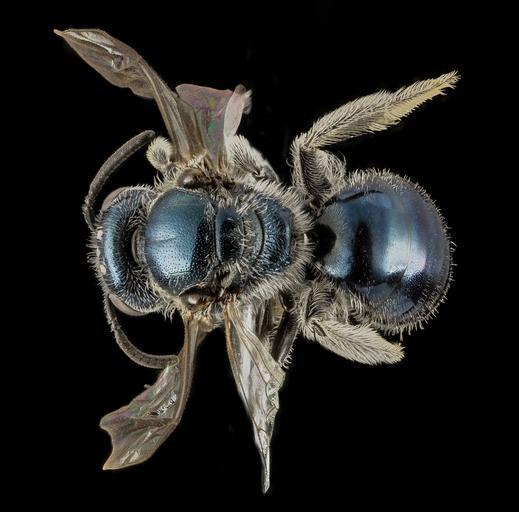MAKE A MEME
View Large Image

| View Original: | Lasioglossum_coeruleum,_F,_Back,_MD,_Talbot_County_2015-01-08-14.48.01_ZS_PMax.jpg (3633x3581) | |||
| Download: | Original | Medium | Small | Thumb |
| Courtesy of: | www.flickr.com | More Like This | ||
| Keywords: bee bees hymenoptera halictidae lasioglossum lasioglossum coeruleum lasioglossumcoeruleum taxonomy:binomial=lasioglossum coeruleum taxonomy:binomial=lasioglossumcoeruleum talbot county talbotcounty maryland eastern east woodlands rotten wood rottenwood usgs pwrc patuxent patuxent wildlife research center patuxentwildliferesearchcenter sam droege samdroege droege native bee nativebee black background animal Such a lovely blue and relatively unusual in the Genus Lasioglossum. At least in the East there is no other Lasioglossum so extensively and uniformly blue. So blue that it is often mistaken for an Osmia. This species is associated with woodlands, feeding on the vernal flora of the woods and nearby fields and nesting in rotten wood. Photography by Brooke Alexander. ~~~~~~~~~~{{{{{{0}}}}}}~~~~~~~~~~ All photographs are public domain, feel free to download and use as you wish. Photography Information: Canon Mark II 5D, Zerene Stacker, Stackshot Sled, 65mm Canon MP-E 1-5X macro lens, Twin Macro Flash in Styrofoam Cooler, F5.0, ISO 100, Shutter Speed 200 The grass so little has to do, A sphere of simple green, With only butterflies to brood, And bees to entertain, - Emily Dickinson Want some Useful Links to the Techniques We Use? Well now here you go Citizen: Basic USGSBIML set up: www.youtube.com/watch?v=S-_yvIsucOY USGSBIML Photoshopping Technique: Note that we now have added using the burn tool at 50% opacity set to shadows to clean up the halos that bleed into the black background from "hot" color sections of the picture. www.youtube.com/watch?v=Bdmx_8zqvN4 PDF of Basic USGSBIML Photography Set Up: ftp://ftpext.usgs.gov/pub/er/md/laurel/Droege/How%20to%20Take%20MacroPhotographs%20of%20Insects%20BIML%20Lab2.pdf Google Hangout Demonstration of Techniques: plus.google.com/events/c5569losvskrv2nu606ltof8odo or www.youtube.com/watch?v=4c15neFttoU Excellent Technical Form on Stacking: www.photomacrography.net/ Contact information: Sam Droege sdroege@usgs.gov 301 497 5840 Such a lovely blue and relatively unusual in the Genus Lasioglossum. At least in the East there is no other Lasioglossum so extensively and uniformly blue. So blue that it is often mistaken for an Osmia. This species is associated with woodlands, feeding on the vernal flora of the woods and nearby fields and nesting in rotten wood. Photography by Brooke Alexander. ~~~~~~~~~~{{{{{{0}}}}}}~~~~~~~~~~ All photographs are public domain, feel free to download and use as you wish. Photography Information: Canon Mark II 5D, Zerene Stacker, Stackshot Sled, 65mm Canon MP-E 1-5X macro lens, Twin Macro Flash in Styrofoam Cooler, F5.0, ISO 100, Shutter Speed 200 The grass so little has to do, A sphere of simple green, With only butterflies to brood, And bees to entertain, - Emily Dickinson Want some Useful Links to the Techniques We Use? Well now here you go Citizen: Basic USGSBIML set up: www.youtube.com/watch?v=S-_yvIsucOY USGSBIML Photoshopping Technique: Note that we now have added using the burn tool at 50% opacity set to shadows to clean up the halos that bleed into the black background from "hot" color sections of the picture. www.youtube.com/watch?v=Bdmx_8zqvN4 PDF of Basic USGSBIML Photography Set Up: ftp://ftpext.usgs.gov/pub/er/md/laurel/Droege/How%20to%20Take%20MacroPhotographs%20of%20Insects%20BIML%20Lab2.pdf Google Hangout Demonstration of Techniques: plus.google.com/events/c5569losvskrv2nu606ltof8odo or www.youtube.com/watch?v=4c15neFttoU Excellent Technical Form on Stacking: www.photomacrography.net/ Contact information: Sam Droege sdroege@usgs.gov 301 497 5840 | ||||